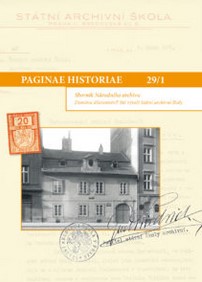DOCENT JOSEF MATOUŠEK A JEHO VĚDECKÁ A POLITICKÁ ČINNOST
SENIOR LECTURER JOSEF MATOUŠEK AND HIS RESEARCH AND POLITICAL ACTIVITIES
Author(s): Jan Hanousek, Kristýna AnsorgováSubject(s): Political history, Political behavior, History of Education, Interwar Period (1920 - 1939)
Published by: Národní archiv
Keywords: Josef Matoušek; research; political life of Josef Matoušek; Czech Union for Collaboration with the Germans;
Summary/Abstract: The first part of the article is devoted to an expert activity of Josef Matoušek in the field of research. It reveals a view of development of his expert interests in the context of studies and work activities, presents either individual topics that Matoušek devoted his attention to or his main works published or not realized due to Matoušek’s early death. Josef Matoušek’s decision to participate fully in the political life of a newly arisen Protectorate of Bohemia and Moravia in fact stopped his scholarly activities. Since his student life Josef Matoušek had dealt with politics, firstly at university, then later during his publishing especially in the journal Cesta (the Way), which he co-established and edited. Only after 15th March 1939 he intended fully to enter into politics when he was named a member of the Výbor Národního souručenství (Committee of the National Liability) by the state president Emil Hácha. Josef Matoušek participated in forming a programme of the party and was a member of other commissions – organisational, masonry and also for youth and physical education where he kept contacts with representatives of the Czech students. His function in Národní souručenství and in Český svaz pro spolupráci s Němci (Czech Union for Collaboration with the Germans) cannot be judged by the later development and seen in it indications of a collaborator. The documents reveal that in spite of Matoušek’s strong opinions from the mid-30ties when he criticised Czech policy and was close to nationalism, he had not been a supporter of Nazis Germany. It is especially clear from the fact that his career, both scholarly and political, was abruptly interrupted on 17th November 1939 when he was executed during the persecution of the Czech universities.
Journal: Paginae Historiae
- Issue Year: 29/2021
- Issue No: 1
- Page Range: 218-240
- Page Count: 23
- Language: Czech

